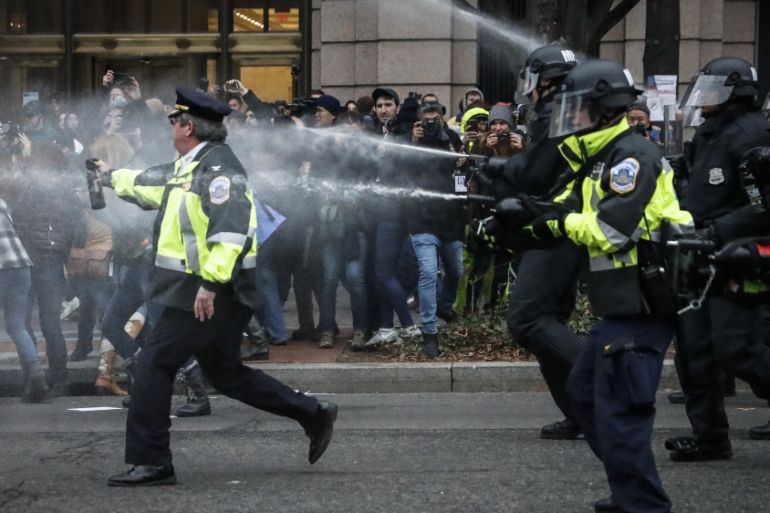Hearing for anti-Trump protest defendants to start
The 22 defendants are among 188 people facing charges related to alleged involvement in an anti-Trump protest.

A status hearing for three batches of defendants arrested during the inauguration of US President Donald Trump is slated for Friday.
The 22 defendants are among 188 people facing a slew of charges related to their alleged participation in a rally against Trump’s inauguration in Washington, DC, on January 20, 2017.
Keep reading
list of 4 itemsPalestinian Prisoner’s Day: How many are still in Israeli detention?
‘Mama we’re dying’: Only able to hear her kids in Gaza in their final days
Europe pledges to boost aid to Sudan on unwelcome war anniversary
The next trial, which is for seven defendants, could start as early as February.
That batch has seen their charges reduced to misdemeanours and will have a bench trial, meaning the judge will determine their verdict rather than a jury.
Most of the 188 people – known collectively as the “J20 defendants” – are facing a swath of felony charges that could land them behind bars for several decades.
Erin Lemkey, a 35-year-old defendant in an upcoming batch of seven, described the attempt to prosecute Inauguration Day protesters as “draconian.
“If they put one anti-capitalist protest through the ringer, it’s a showcase for the new range of possible penalties for other protests,” Lemkey told Al Jazeera, arguing that the case could set a precedent for authorities to intensify the criminalisation of other protest groups and activists.
Mass arrests
During the anti-fascist bloc march on January 20, police attacked demonstrators with tear gas and sound grenades, surrounding them and carrying out mass arrests.
Among those arrested were demonstrators, medics, legal observers, reporters and bystanders. More than 230 people were charged with felony rioting.
In April, the DC Superior Court returned a superseding indictment that included additional felony charges for 212 defendants, three of whom were not among the initial group of those who were charged on January 21.
With new felony charges including urging to riot, conspiracy to riot and destruction of property, many of the defendants were facing more than 70 years in prison.
Some charges have been dropped and others reduced, putting the bulk of the defendants at risk of more than six decades behind bars.
Authorities allege that demonstrators carried out more than $100,000 worth of property damage and endangered police officers.
“There were plenty of people who [aren’t now defendants] who were harshly sprayed, pushed and shocked and scared by exploding devices,” Lemkey recalled.
“The atmosphere in the air was very much established by police and their arsenal of tools. That continued to happen even while people were kettled,” she said, referring to a police tactic that involves confining demonstrators to a small area.
Rights groups and watchdogs subsequently denounced the police officers’ use of force against demonstrators and others during the demonstration.
Last month, six people who made up the first batch of defendants, and were facing charges that could have put them in prison for up to 51 years, were found not guilty on all counts.
After that verdict, the District of Columbia US Attorney’s Office released a statement expressing its appreciation of the jury’s “close examination of the individual conduct and intent of each defendant during this trial.
“In the remaining pending cases, we look forward to the same rigorous review for each defendant,” the statement said.
Describing the first trial’s verdict as “a hopeful sign”, ACLU-DC senior lawyer Scott Michelman said Americans “will still have to grapple with the chilling effect of the prosecutors’ actions.
“We shouldn’t pretend that now six people have been acquitted and it’s full speed ahead for the first amendment and no one has paid a price and no speech has been chilled,” he told Al Jazeera.
“Even those acquitted, they spent months and months dealing with anxiety and defending themselves, with this cloud hanging over their heads.”
For her part, Lemkey hopes the not guilty verdict of the first trial will inspire broader solidarity with the remaining defendants.
“I hope that the success that was had with the first trial ripples out and reaches people and causes them to engage with the case,” Lemkey said.
“I think that people need that sense of hope, and there is a very interesting fight going on that they could be a part of as people who protest against the Trump administration, racism, sexism and inequality.”